Will Poulter and Kit Connor: We shaved each other's heads before filming Warfare
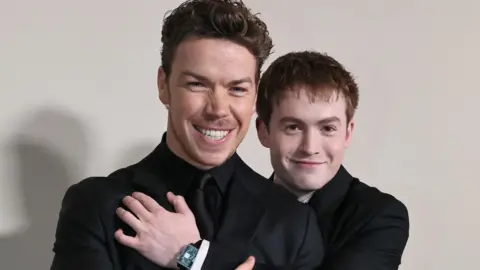 Getty Images
Getty ImagesThe young cast of Alex Garland and Ray Mendoza’s film Warfare had to bond pretty quickly, to play a US military unit whose lives depended on each other, during the Iraq war in 2006.
Familiarity was crucial, so before filming began, the cast were sent on a three-week military bootcamp.
They lived together, learning military jargon and gun safety and were pushed beyond their limits - all of which brought them closer together.
First off though, they agreed to shave each other's heads to look the part, boosting trust and familiarity.
"We shaved our heads on day one, and got tattoos at the end of the process, so it bookended the experience," Poulter tells the BBC.
The actor, who recently appeared in The Bear and Guardians of the Galaxy Vol 3, plays Captain Eric, who was part of a group of US soldiers and Iraqi scouts on a surveillance mission.
We see how it goes wrong, with devastating consequences.
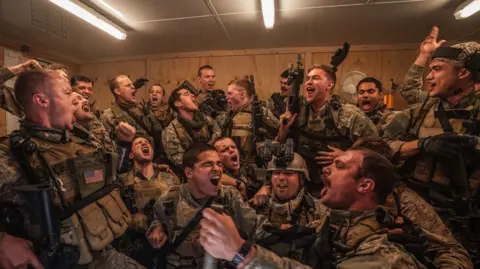 Murray Close
Murray CloseHeartstopper star Connor plays newcomer Tommy, hitting home how young the soldiers were - he's just turned 21, the same age Tommy was at the time.
The actor says the decision to get a shared tattoo with his castmates after filming wrapped was a "no-brainer". The casts of The Avengers and The Lord of the Rings did the same thing after their final films.
Warfare's actors decided their tattoo would say "Call On Me", to reflect their brotherhood, while referencing Erik Prydz's 2004 dance hit, which kicks the film off.
The cast features some other big names, including Reservation Dogs' D'Pharaoh Woon-A-Tai, Shōgun's Cosmo Jarvis, Stranger Things and the forthcoming Beatles biopic's Joseph Quinn, and Riverdale's Charles Melton.
"It was really formative for me," Connor says about his time on the film. "I've made friends I really do believe I will know for a long time.
"We all wanted to commemorate it - we are so proud of the work we've done together."
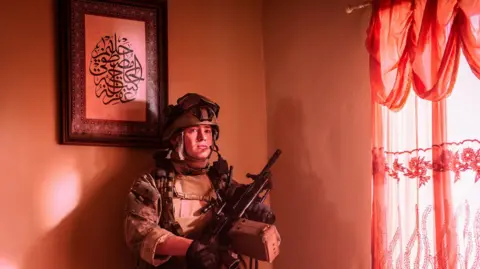 Murray Close
Murray CloseThe movie is based entirely on a real-life mission that took place during the Iraq war, and is built on the memories of the US soldiers who were there.
The group was embedded in the home of an ordinary Iraqi family, who we briefly see in the film, in Ramadi - an area controlled by Al-Qaeda forces.
The military's goal had been to slip into and observe the area under the cover of darkness, to ensure the safe passage of ground forces there the next day.
What they didn't know what that they were next door to an insurgent house, making them the target of an attack.
Shot in real-time, Warfare has no music or flashbacks, so there's no let-up for the audience. You're dropped into the thick of the action for the whole film.
The soldiers in command have to make split-second decisions amid the pain and chaos, with the Iraqi family caught in the crossfire.
Oscar nominee Garland, whose back catalogue includes the 28 Days film franchise and Ex Machina, got the idea for Warfare when he was making last year's film Civil War.
He was working on the battle scenes with Hollywood stunt man and gunfight co-ordinator Ray Mendoza.
"During the edit process of Civil War, I was able to really focus on some of the work Ray had done, and how sophisticated and how nuanced it was," Garland recalls.
They got chatting about Mendoza's previous life as a US Navy Seal, and about the Ramadi operation, where he was its communications officer.
Mendoza said he'd always wanted to make a film about that mission.
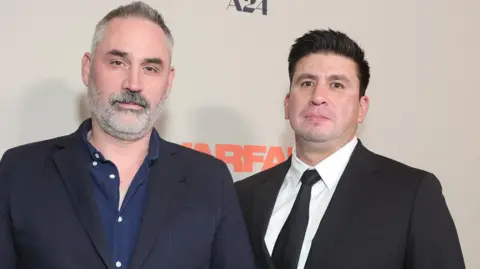 Getty Images
Getty ImagesThe veteran had a very big reason for wanting to recreate what happened that day - to help replace the lost memories of his colleague Elliott Miller.
Miller, a former Navy Seal, was so badly injured in Ramadi that he suffered traumatic brain injury and memory loss, and had to have a leg amputated.
During the mission, Mendoza carried the unconscious soldier to the rescue tank that ultimately saved his life.
"Elliott doesn't remember it, and when he woke up, he had a lot of questions," Mendoza says.
"No matter how many maps we drew, or how many times we wrote it out - without that core memory, I think he's had a hard time.
"It just raised more questions than answers. So I wanted to recreate this one."
So Garland and Mendoza decided to make Warfare together, sharing writing and directing credits, and dedicating the film to Miller.
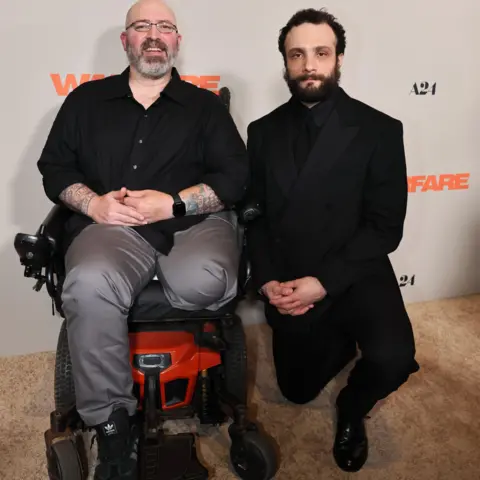 Getty Images
Getty ImagesThe crucial question is whether seeing the film helped Miller piece things together.
"It did, yeah - he was a sponge," Mendoza says.
"We walked him through it - he had a lot of questions, he's got kids that have questions.
"It's now a film memory, but it's as close as he's gonna have – he's super grateful."
Miller was played by Jarvis, who calls him "a funny guy... he's great - a living embodiment of perseverance".
It was a "unique situation to be in when you're entrusted with portraying somebody that's sitting right across from you", Jarvis said, about having the person he was playing actually on set.
"But because he didn't remember [what happened], a lot of my references had to come from his colleagues."
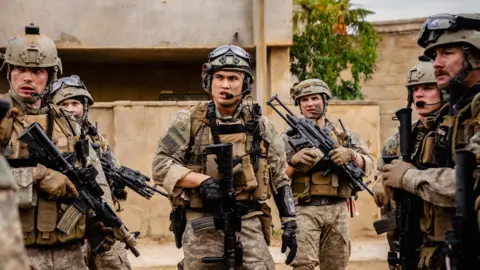 Murray Close
Murray CloseThe soldiers' casting has caused some excitement online, with some publications breathily calling the actors "all of the internet's boyfriends" and "red hot rising stars".
Garland arches an eyebrow at this, and Mendoza jumps in to talk about why those actors were chosen.
"I've said this to them, so I'm not trying to offend them, but we weren't looking for the best actors. They're all great actors. We were looking for the right actors," he says.
"So what that means is their willingness to push their bodies past a comfort level that they're maybe not used to. 'You're gonna be exhausted. You're gonna be required to rely on other people. It's not about you, it's about the team'.
"And the ones that jump at that opportunity, you're like, 'Yep, that's the attitude that we need'."
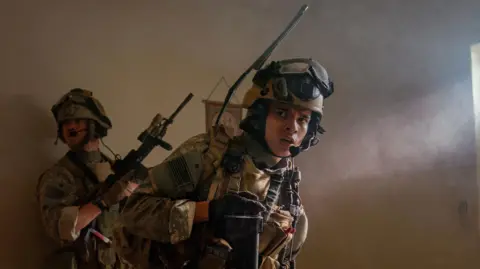 Murray Close
Murray CloseCollating and cross-checking the soldiers' memories was a big job, largely undertaken by Garland.
"I think there's an inherent value in attempting to be honest and truthful about something as serious and significant as war," he says.
He shot the film in a studio in a suburb north of London, on a former World War Two airfield, making it in real-time to recreate "a real incident of combat... as honestly, forensically and accurately as possible".
Not surprisingly, while sharing credits with Garland, former US Navy Seal Mendoza ran the actors' bootcamp.
He was played by Woon-A-Tai, who calls him "a brilliant instructor who instilled a lot of confidence in us", while also making gun safety a top priority.
The actor was also fascinated by the narrative not being "dramatised or Hollywoodised".
"To see these guys not obey orders - and do what they needed to save their platoon was interesting to me," he says, talking about the soldiers' evacuation process.
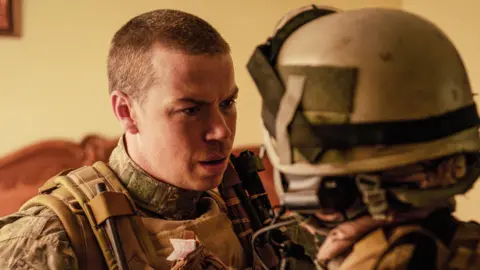 Murray Close
Murray CloseMendoza thinks the film may also help veterans who are struggling to express what warfare can be like.
"Some of these things are harder to explain in words," he says. "So art imagery is how I'm able to communicate that."
Connor echoes this, saying: "A lot of these men are very much less inclined to talk about themselves in these situations, whether it be to be due to humility, or a difficulty in really articulating it.
"A lot of them just don't really enjoy talking about their involvement."
The film has been called "the most harrowing – and honest – depiction of modern combat ever made" by the Telegraph, while the New Yorker said it offers a "hyperrealist rebuke of the American war movie".
The Guardian said the "film-makers' message gets lost in the deafening blizzard of battle", while Empire added: "It may well be cinema's most effective, purest anti-war film: there is no sentimentality, no hand-wringing, but most significantly not a second of it makes war look cool, or attractive."
Poulter says he admires the film-makers' determination to make Warfare purely factual.
"Hopefully this film contributes to a better understanding of just how negative, and how the consequences of war are characterised by a lot of loss...
"I think this is as much an anti-war film as you can possibly hope to see."
Warfare is out in cinemas on Friday, 18 April.
